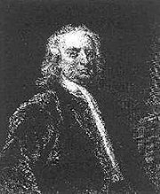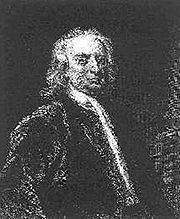
Nicolas Fréret
Encyclopedia

France
The French Republic , The French Republic , The French Republic , (commonly known as France , is a unitary semi-presidential republic in Western Europe with several overseas territories and islands located on other continents and in the Indian, Pacific, and Atlantic oceans. Metropolitan France...
scholar.
Life
He was born at ParisParis
Paris is the capital and largest city in France, situated on the river Seine, in northern France, at the heart of the Île-de-France region...
on 15 February 1688. His father was procureur to the parlement of Paris, and destined him to the profession of the law
Law
Law is a system of rules and guidelines which are enforced through social institutions to govern behavior, wherever possible. It shapes politics, economics and society in numerous ways and serves as a social mediator of relations between people. Contract law regulates everything from buying a bus...
. His first tutors were the historian Charles Rollin
Charles Rollin
Charles Rollin was a French historian and educator. He was born in Paris.-Biography:He was the son of a cutler, and at the age of twenty-two was made a master in the Collège du Plessis. In 1694 he was rector of the University of Paris, rendering great service among other things by reviving the...
and Father Desmolets (1677-1760). Amongst his early studies history, chronology and mythology held a prominent place.
To please his father he studied law and began to practise at the bar
Bar (law)
Bar in a legal context has three possible meanings: the division of a courtroom between its working and public areas; the process of qualifying to practice law; and the legal profession.-Courtroom division:...
; but the force of his genius soon carried him onto his own path. At nineteen he was admitted to a society of learned men before whom he read memoirs on the religion of the Greeks
Greeks
The Greeks, also known as the Hellenes , are a nation and ethnic group native to Greece, Cyprus and neighboring regions. They also form a significant diaspora, with Greek communities established around the world....
, on the worship of Bacchus
Dionysus
Dionysus was the god of the grape harvest, winemaking and wine, of ritual madness and ecstasy in Greek mythology. His name in Linear B tablets shows he was worshipped from c. 1500—1100 BC by Mycenean Greeks: other traces of Dionysian-type cult have been found in ancient Minoan Crete...
, of Ceres, of Cybele
Cybele
Cybele , was a Phrygian form of the Earth Mother or Great Mother. As with Greek Gaia , her Minoan equivalent Rhea and some aspects of Demeter, Cybele embodies the fertile Earth...
, and of Apollo
Apollo
Apollo is one of the most important and complex of the Olympian deities in Greek and Roman mythology...
. He was hardly twenty-six years of age when he was admitted as pupil to the Academy of Inscriptions. One of the first memoirs which he read was a learned and critical discourse, Sur l'origine des Francs (1714). He maintained that the Franks
Franks
The Franks were a confederation of Germanic tribes first attested in the third century AD as living north and east of the Lower Rhine River. From the third to fifth centuries some Franks raided Roman territory while other Franks joined the Roman troops in Gaul. Only the Salian Franks formed a...
were a league of South German tribes and not, according to the legend then almost universally received, a nation of free men deriving from Greece or Troy
Troy
Troy was a city, both factual and legendary, located in northwest Anatolia in what is now Turkey, southeast of the Dardanelles and beside Mount Ida...
, who had kept their civilization intact in the heart of a barbarous country. These views excited great indignation in the Abbé Vertot, who denounced Freret to the government as a libeller of the monarchy. A lettre de cachet was issued, and Freret was sent to the Bastille
Bastille
The Bastille was a fortress in Paris, known formally as the Bastille Saint-Antoine. It played an important role in the internal conflicts of France and for most of its history was used as a state prison by the kings of France. The Bastille was built in response to the English threat to the city of...
.
During his three months of confinement he studied Xenophon
Xenophon
Xenophon , son of Gryllus, of the deme Erchia of Athens, also known as Xenophon of Athens, was a Greek historian, soldier, mercenary, philosopher and a contemporary and admirer of Socrates...
, the fruit of which appeared later in his memoir on the Cyropaedia. From the time of his liberation in March 1715 his life was uneventful. In January 1716 he was received as associate of the Academy of Inscriptions and in December 1742 he was made perpetual secretary. He worked without intermission for the interests of the Academy, not even claiming any property in his own writings, which were printed in the Recueil de l'academie des inscriptions.
Works
The list of his memoirs, many of them posthumous, occupies four columns of the Nouvelle Biographie générale. They treat of history, chronology, geography, mythology and religion. Throughout he appears as the keen, learned and original critic; examining into the comparative value of documents, distinguishing between the mythical and the historical, and separating traditions with an historical element from pure fableFable
A fable is a succinct fictional story, in prose or verse, that features animals, mythical creatures, plants, inanimate objects or forces of nature which are anthropomorphized , and that illustrates a moral lesson , which may at the end be expressed explicitly in a pithy maxim.A fable differs from...
s and legend
Legend
A legend is a narrative of human actions that are perceived both by teller and listeners to take place within human history and to possess certain qualities that give the tale verisimilitude...
s. He rejected the extreme pretensions of the chronology of Egyptian
Ancient Egypt
Ancient Egypt was an ancient civilization of Northeastern Africa, concentrated along the lower reaches of the Nile River in what is now the modern country of Egypt. Egyptian civilization coalesced around 3150 BC with the political unification of Upper and Lower Egypt under the first pharaoh...
origin for the Chinese civilisation
Culture of China
Chinese culture is one of the world's oldest and most complex. The area in which the culture is dominant covers a large geographical region in eastern Asia with customs and traditions varying greatly between towns, cities and provinces...
and charactersSee Ch.XII, p.100 & 101. Fréret is oppose to Fourmont's theories who back the Chinese culture to Noe's children, Egyptian origins, and Hebraic language., and at the same time controverted the scheme of Sir Isaac Newton
Isaac Newton
Sir Isaac Newton PRS was an English physicist, mathematician, astronomer, natural philosopher, alchemist, and theologian, who has been "considered by many to be the greatest and most influential scientist who ever lived."...
as too limited. He investigated the mythology not only of the Greeks, but of the Celts, the Germans, the Chinese and the India
India
India , officially the Republic of India , is a country in South Asia. It is the seventh-largest country by geographical area, the second-most populous country with over 1.2 billion people, and the most populous democracy in the world...
ns. He was a vigorous opponent of the theory (euhemerism) that the stories of mythology may be referred to historic originals. He also suggested that Greek mythology owed much to the Phoenicia
Phoenicia
Phoenicia , was an ancient civilization in Canaan which covered most of the western, coastal part of the Fertile Crescent. Several major Phoenician cities were built on the coastline of the Mediterranean. It was an enterprising maritime trading culture that spread across the Mediterranean from 1550...
ns and Egypt
Egypt
Egypt , officially the Arab Republic of Egypt, Arabic: , is a country mainly in North Africa, with the Sinai Peninsula forming a land bridge in Southwest Asia. Egypt is thus a transcontinental country, and a major power in Africa, the Mediterranean Basin, the Middle East and the Muslim world...
ians.
He was one of the first scholars of Europe to undertake the study of the Chinese language, under the guidance of Arcadio Huang
Arcadio Huang
Arcadio Huang, also Arcadius Huang or Arcade Huang , was a Chinese Christian convert, brought to Paris by the Missions étrangères. He took a pioneering role in the teaching of the Chinese language in France around 1715...
, a Chinese man working as translator and librarian for king Louis XIV; and in this he was engaged at the time of his committal to the Bastille. He died in Paris on 8 March 1749.
After his death several works of an atheistic character were falsely attributed to him, and were long believed to be his. The most famous of these are the Examen critique des apologistes de la religion chrétienne (1766), and the Lettre de Thrasybule à Leucippe, printed in London about 1768.
A very defective and inaccurate edition of Fréret's works was published in 1796-1799. A new and complete edition was projected by Jacques Joseph Champollion-Figeac
Jacques Joseph Champollion-Figeac
Jacques Joseph Champollion-Figeac was a French archaeologist, elder brother of Jean-François Champollion .-Biography:He was born at Figeac in the département of Lot...
, but of this only the first volume appeared (1825). It contains a life of Fréret. His manuscripts, after passing through many hands, were deposited in the library of the Institute. The best account of his works is Examen critique des ouvrages composes par Fréret in C. A. Walckenaer's Recueil des notices, &c. (1841-1850). See also Quérard's France litteraire.

